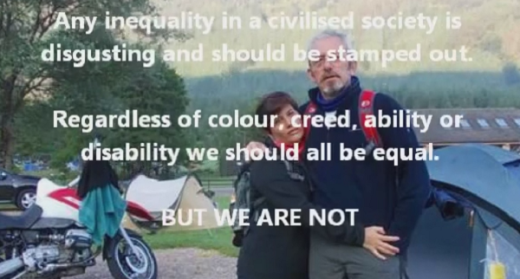
In a move that has some feminists and others re-thinking their approach to men’s issues, a group of Men’s Rights Movement (MRM) advocates have, through hard work and sacrifice, built a vast network of shelters and other services for marginalized and vulnerable men in the US.
The group, called Helping Men Instead of Hating Women (HMIHW), found itself at a crossroads five years ago. “We saw how feminists and civil rights activists solved problems with an attitude of determination and hard work,” says 21-year old Gabe Elota, a member of HMIHW’s Board of Directors. “In the MRM, the focus has rarely been on what can be done to improve the lives of marginalized men, as opposed to pushing a feeling of powerlessness to change our futures. But, just for example, the civil rights movement—they didn’t sit around bashing white power and then expect white people and the government to do things for them. They went out, they used a variety of tactics from gathering support for legislative action, to civil disobedience. They had to be the change, and we look at those successes, and we think those happened for a reason.”
Elota wants people to know that not all MRAs (Men’s Rights Advocates) are the same. “We at HMIHW see that men as a class are not oppressed simply because they are male. But, we do know that there are men who are marginalized—veterans, men of color, gay and trans men. Even some straight white men are running around out there trying to figure out how they fit in, how to make it in a hostile economy. A lot of men are just alienated by the society they perceive as rejecting them. We’re not here to bash women, we’re here to get things done and help those men and boys get to a better place.”
For years, the MRM has existed, without making much of a dent in the way society perceives and assists men. Some members of the MRM began to feel the problem was internal, and more than just a messaging issue.
That’s when a group of loosely-knit men and women decided to act.
43-year old Paul Mattson, a computer technician and single father, explains: “We first did research on what exactly the needs were—we looked into demographics, we studied poverty and its effect on men, we studied the court system. We asked ourselves, ‘What do men need? Legal support? Food and shelter? Medicine? Work?’ And when we identified what needed to be done, the next step was to look at other models which had in the past been successful at filling these needs, and to incorporate that into our vision. Then we tweaked things until it fit for our goals.”
After three years of hard work, the organization had built its first men’s shelter, in San Diego, CA. Named “Hands of Healing,” the shelter currently services 30-40 men, whose needs range from housing to shelter from violent partners. It has served over 400 men in the course of two years, with an outpatient addictions counseling unit that San Diego Interim Mayor Todd Gloria has lauded for its visible impact on the city. “San Diego is a safer place for men and women alike,” Mayor Gloria said in a recent press conference, “and hundreds of men in this city alone can thank the men’s rights movement, for the tangible results they have produced in improving the quality of our lives.”
Today in America, dozens of HMIHW shelters, legal groups and advocacy centers can be found from coast to coast. Thousands of men are receiving services they otherwise would not have access to, if not for Helping Men Instead of Hating Women.
“It really is more about, what can we do to change things? How can we help men? Do we accomplish this by complaining that we’ve got it bad, but not backing it up with action? Or do we roll up our sleeves, get out there and build something real? I’ll stick with the latter, thank you very much.”
Disassociated Press–San Diego, CA
In a move that has some feminists and others re-thinking their approach to men’s issues, a group of Men’s Rights Movement (MRM) advocates have, through hard work and sacrifice, built a vast network of shelters and other services for marginalized and vulnerable men in the US.
The group, called Helping Men Instead of Hating Women (HMIHW), found itself at a crossroads five years ago. “We saw how feminists and civil rights activists solved problems with an attitude of determination and hard work,” says 21-year old Gabe Elota, a member of HMIHW’s Board of Directors. “In the MRM, the focus has rarely been on what can be done to improve the lives of marginalized men, as opposed to pushing a feeling of powerlessness to change our futures. But, just for example, the civil rights movement—they didn’t sit around bashing white power and then expect white people…
View original post 526 more words




LikeLiked by 1 person
LikeLiked by 1 person
Pingback: Feminist Arguing About Parenting Rights 101 ~ How To Look Credible While Being Dishonest | American Fathers